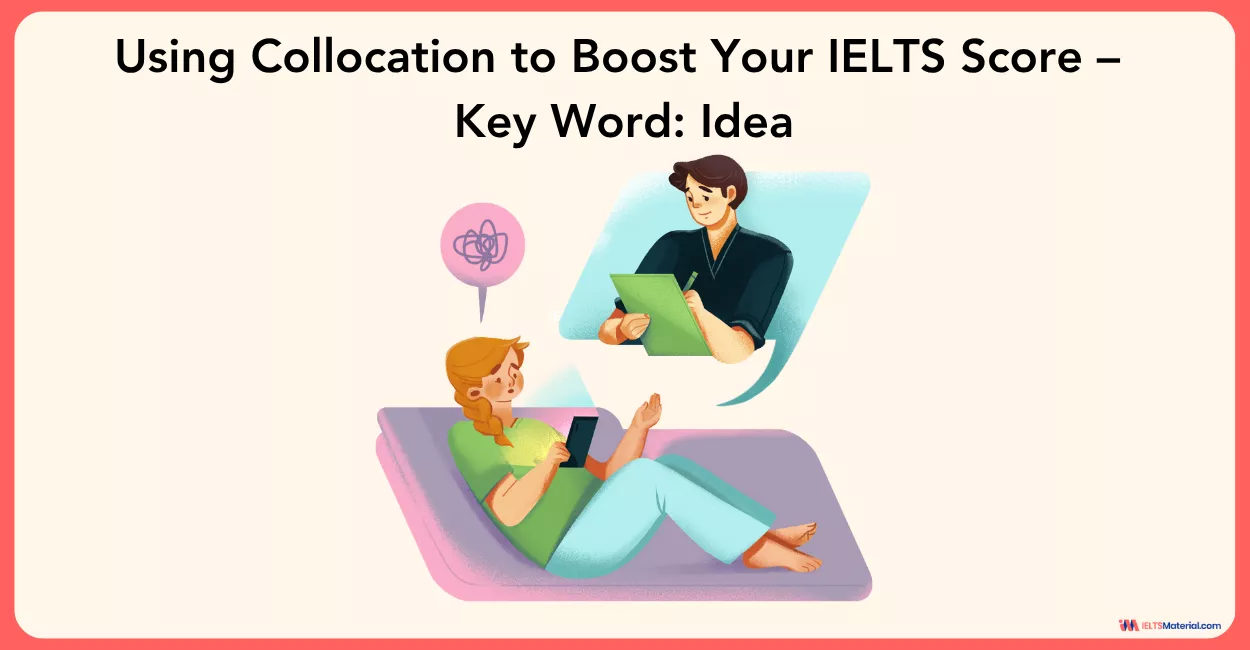Using Collocation to Boost Your IELTS Score – Key Word: Idea
4 min read
Updated On
-
Copy link
Learn essential collocations with “idea” to speak and write naturally in IELTS. Includes verb, adjective, and expression collocations with examples and answers to boost your fluency and coherence.
Table of Contents

Limited-Time Offer : Access a FREE 10-Day IELTS Study Plan!
Having a strong command of collocations can significantly improve your IELTS Writing and Speaking scores. The word “idea” is one of the most versatile nouns in English, used to express opinions, suggestions, and creativity. In this blog, you’ll learn how to use common verb, adjective, and expression collocations with “idea” naturally in your IELTS answers.
What Are “Idea” Collocations?
Collocations are natural word combinations used by native speakers. When you use correct collocations, your speech and writing sound fluent and accurate.
For example, instead of saying “create an idea,” native speakers say “come up with an idea.”
Using these combinations correctly helps you achieve a higher Lexical Resource score in IELTS.
Verb + Idea Collocations
Verb collocations show how we express, create, or respond to ideas. They are essential in IELTS Writing essays and discussions, especially when developing arguments or giving opinions.
Verbs: consider, come up with, get across, reject, go along with, sell
Complete the sentences with the correct verb:
- He’s a really good speaker. He has that rare ability to _________ complex ideas in language everyone can understand.
- We’ve been _________ the idea of moving to a smaller flat now that the children have left home.
- The committee needs to _________ some ideas for raising funds for the new church. Does anybody have any suggestions?
- She’s always _________ the idea of getting married. She says she prefers the freedom of being single.
- I think my proposal would help improve the company, but I’m having trouble _________ the idea to my boss.
- She’ll never _________ the idea, so it’s not worth mentioning it to her.
These collocations are especially useful for IELTS Writing Task 2 essays when discussing opinions or proposals, e.g., “Many people reject the idea of increasing taxes to fund education.”
Feeling stuck with IELTS Vocabulary? Register for our webinar and unlock your potential today!
Expressing Liking and Disliking Ideas
In IELTS Speaking, you often need to express your attitude toward suggestions or opinions. Below are common expressions that show whether you like or dislike an idea. Fill in the prepositions and mark each as (L) for like or (D) for dislike:
- dead _________ the idea
- receptive _________ new ideas
- a lot of resistance _________ the idea of
- bitterly opposed _________ this idea
- not wild _________ the idea
- in favour _________ the idea
- sold _________ the idea
- hostile _________ the idea
These phrases are perfect for IELTS Speaking Part 3 and Writing Task 2 when presenting or evaluating arguments.
Want to improve your grammar? Get the newly launched IELTS Grammar book today!
Common Adjective + Idea Collocations
Adjective + “idea” collocations describe the type or quality of an idea.
Adjectives: brilliant, faintest, half-baked, fixed, funny, original, vague, fair
Complete the sentences with the correct adjective:
- The company is looking for a creative person with fresh and _________ ideas.
- You’ll never get my mother to change her mind! She has very _________ ideas on almost every subject.
- What a _________ idea! Why didn’t I think of that?
- He’s got some strange ideas on bringing up kids. Yes, Frank does have some _________ ideas at times, doesn’t he?
- I think I’ve got a _________ idea of what to do, but I’ll get back to you if I have any problems.
- I haven’t the _________ idea what you’re talking about!
These collocations are useful for IELTS Speaking Part 2 and Writing Task 2 when describing suggestions, evaluating ideas, or showing creativity.
Struggling with grammar for the IELTS? Sign up for our online class & master the words to succeed!
Answer Key
Exercise 1: Verb + Idea
- get across
- considering
- come up with
- rejected
- selling
- go along with
Exercise 2: Liking/Disliking Ideas
- dead against (D)
- receptive to (L)
- a lot of resistance to (D)
- bitterly opposed to (D)
- not wild about (D)
- in favour of (L)
- sold on (L)
- hostile to (D)
Exercise 3: Adjective + Idea
- original
- fixed
- brilliant
- funny
- fair
- faintest
Visit IELTS eBooks store for top-rated books & elevate your IELTS preparation!
Mastering collocations with “idea” is essential for improving your IELTS performance. It allows you to express opinions and suggestions clearly in Speaking Part 3, write coherent and precise arguments in Writing Task 2, and understand natural English usage in Listening and Reading sections. By using phrases like “come up with an idea,” “reject the idea,” or “a half-baked idea,” your English will sound more fluent and natural, significantly enhancing your chances of achieving Band 7 or higher.
Also Check:
- Improve Your Vocabulary for IELTS – Key Word: Space
- Improve Your Vocabulary for IELTS – Key Word: Size
- Using Collocation to Boost Your IELTS Score - Key Word: decision
- Using Collocation to Boost Your IELTS Score - Key Word: a series of
- Grammar For IELTS : The Common Grammars And Sentence Structures In English (Part 1
- Grammar For IELTS : The Common Grammars And Sentence Structures In English (Part 2)
- Using Contrast in IELTS Speaking & Writing: Advanced Grammar in IELTS
- 100+ Advanced Vocabulary Word List for IELTS (PDF Available)

Start Preparing for IELTS: Get Your 10-Day Study Plan Today!
Recent Articles

Nitika Gupt

Nehasri Ravishenbagam

Nehasri Ravishenbagam





Post your Comments